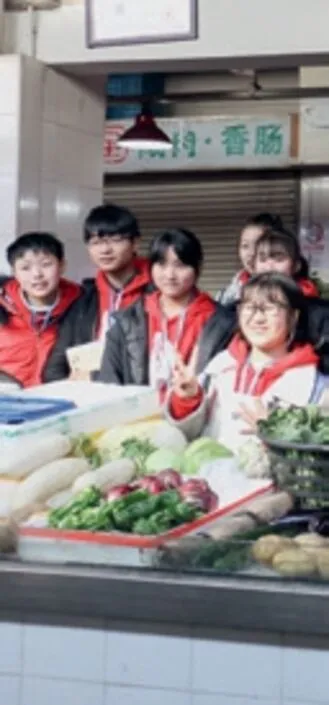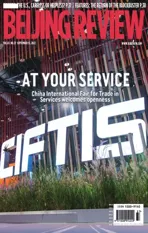Enlighten and Brighten
2022-09-16YoungChinesehopetobreaktheurbanruralbarrierByLuYan
Young Chinese hope to break the urban-rural barrier By Lu Yan
Many people cannot hide their surprise at Wang Xingyu’s current job when he mentions his college major. Having studied international relations, the 30-year-old entrepreneur today works to promote rural development.
“I decided to devote myself to rural development in China exactly because of what I’ve studied,” Wang told. “After learning from professors and traveling and living in different countries for a few years, I realized what I really enjoyed doing was teaching-related work and enabling more children, especially the disadvantaged ones, to broaden their horizons.”
Wang cofounded a company for this very purpose in 2017. His business aims to better connect China’s countryside and cities by informing urban students about village life and helping rural teenagers explore the urban unknown and expand their future career paths.

Wang Xingyu (right)poses with rural students and the market vendors they’re temporarily working for
“The experience made me realize we should in the end follow our heart and do what we really like in life.Plan, play to our strengths and contribute to our family,society and country.”
Shi Rong,a freshman-to-be at Central South University in Changsha,Hunan Province
Unexpected eye-openers
The idea of contributing to rural development and narrowing the urban-rural gap came to Wang years earlier. When pursuing a master’s degree in the U.S.,a classmate asked him what China’s rural regions were like. Born into a public servant’s family in the suburbs of bustling metropolis Shanghai, Wang wasn’t sure how to answer the question correctly. It was then that he realized his experiences and ideas were too narrow to paint a full, let alone accurate,picture of the real China.
Following graduation, Wang returned to China and first joined a nonprofit organization to help poor farmers sell their produce nationwide. What shocked him was that some of these impoverished villages and towns were hidden deep in the mountains and forests, completely isolated from the world, without any electricity or hot water. The percapita income of the villagers was unsurprisingly low. “Plus, those adults who were able to leave had gone off to work in big cities, leaving behind only seniors and children,” Wang recalled.
From that moment on, the budding entrepreneur became ever more determined to do his share to help rural students in need. Together with his college schoolmate from Fudan University, he founded Beyond the City, a social enterprise whose main goal is to promote social or environmental welfare—rather than maximize profits.
According to results from the seventh national census conducted in 2020 and released by the National Bureau of Statistics in May last year,nearly 510 million people live in rural areas on the Chinese mainland, accounting for 36.11 percent of the total population.
One of the company’s main programs is to create opportunities for rural children to experience urban life and work. They contact schools from relatively poor or remote villages all over the country and select those students with solid academic performance or who stand out in their interviews to join the company on a city trip. They usually invite up to 60 children at a time to enjoy the excursion—all free of charge.
Shi Rong was one of the students from a school in a village in Xiangxi Tujia and Miao Autonomous Prefecture, Hunan Province. She participated in a program that took students living 1,400 km from Shanghai right into the heart of this megacity in 2019.
When Beyond the City staff members first visited her school, they asked students what they wanted to be when they grew up. A science lover, Shi said she wanted to be a scientist. The question prompted Shi to further contemplate her future and goals, and draft a clear outline.

During her trip, Shi experienced numerous aspects of urban life and thought more about what she wanted to do in the future. “The experience made me realize we should in the end follow our heart and do what we really like in life. Plan,play to our strengths and contribute to our family, society and country,” Shi told.
A rewarding experience was going to the farmers’ market and helping vendors sell agricultural products. Although born and raised in the poorer countryside, Shi’d never had to work. Getting up early in the morning and being a busy bee for hours on end, Shi and her schoolmates started to understand the hardships of earning a living. “That made me understand how my parents have toiled away to create a better life for me. I decided to work even harder after that one day at the market,” Shi added.
They also worked at a hotel and an educational institution, as well as visited a bank, a designing institute and several museums in Shanghai. Beyond the City staff also created pretend job interviews and evaluations, giving the young students an idea of how to choose a career path.
“I’d been a little uncomfortable with the cities and their residents. I thought they might look down on people from small villages, but the trip proved me wrong and dispelled my fears of the unknown. I realized we are all people in pursuit of happiness through hard work,” Shi said.
In August this year, a freshman-to-be at Central South University in Changsha, capital of Hunan Province, Shi volunteered for Beyond the City, guiding a group of students from different villages on their trip to Chengdu, Sichuan Province. She wanted others be enlightened just like she was three years ago.
The trip proved inspiring for the group. While visiting a medical company,a student from a remote mountain village of Garze County in Sichuan told Shi that she wanted to work in the healthcare industry in the future to develop new cures.
“Seeing the outside world is the starting point of education and the foundation of equality,”Wang explained. “With horizons expanded, and boundaries broken, the younger generations will have seeds of hope planted in their hearts, which in no time will grow into towering trees—provided they receive the right nourishment.”
The real country-sight
“Rural development needs urban support, while urban children need rural experience,” Wang said. Another one of Beyond the City’s outstanding programs takes city students into the rural areas.
In China, the urban-rural disparity is distinct in terms of income, education, medical care,public service, employment and infrastructure,even though the income gap between residents continues to narrow. Many urban students are complete strangers to country life.
Wang and his colleagues wanted to create a bridge for them to learn more about the real rural scenery, culture and way of life. They developed schedules in line with the features of different villages, such as learning unique local operas and taking in some characteristic architecture. “I hope that after finishing the program,they will reflect on their time in the rural areas,even if it was very short,” he said.
They also take students out to farms and live in villagers’ homes. The trip may cost students about 4,000 to 7,000 yuan ($576 to 1,009),depending on different itineraries. About 50 percent of the income will go to the villages.Wang said the trip is much cheaper than a study tour abroad, thus gaining increasing popularity among parents and students. So far, the program has given over 10,000 middle and high school students the opportunity to get a real taste of the Chinese countryside.
Wang believes traveling through the countryside with these young people has changed him for the better. “I’ve become much more down to earth.I used to be stuck in my own world. Now, like the students in our program, I’m getting to know a multidimensional country, a world with infinite possibilities,” he concluded. BR
